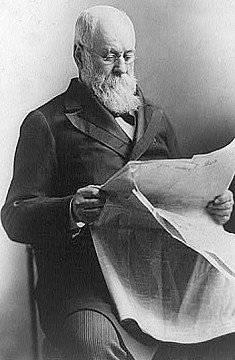Charles Anderson Dana (1819-1897)
U.S. Assistant Secretary of War; Co-Owner & Editor of The New York Sun
He was born at Hinsdale, New Hampshire. Ill health prevented him completing his studies at Harvard and in 1841 he went to live in the experimental community farm near Boston, Brook Farm, becoming a trustee and writing for the farm's publication the Harbinger that championed social reform and the Transcendentalist movement spear-headed by Ralph Waldo Emerson. He joined the staff of the New York Tribune in 1847 and two years later was its owner and managing editor, championing the anti-slavery movement. During the Civil War, he was appointed to the War Office as Lincoln's "eyes of the administration," but from 1868 became the part-owner and editor of The New York Sun that under his management became a Democratic and outspoken tool for change. He built a mansion in New York City at Madison Avenue and 60th Street which he furnished with paintings, tapestries and Chinese porcelains, and at his country home, Dosoris, on Long Island, he planted a "world renowned arboretum". He was deeply interested in horticulture, poetry, and history of art, and in relation to his treasured collection of Chinese porcelains, he proudly boasted: "They are not in the British Museum; they are not in the Louvre; and they are conspicuously absent at Dresden".





